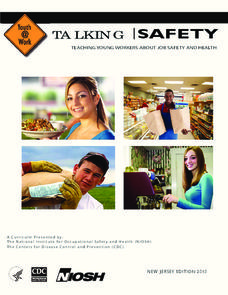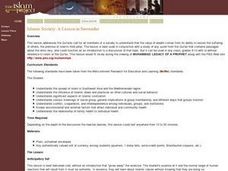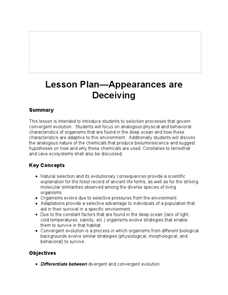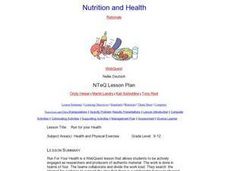Curated OER
Public and Private
Students list places that are considered private and public. In this health science lesson, students discuss behavior appropriate for each setting. They complete the assigned checklist.
Agency for Toxic Substances and Disease Registry
Don't Mess with Mercury (Lesson A)
Mercury is the only metal that is a liquid at room temperature. Teach your class this and many more interesting mercury facts by assigning an engaging task. A public relations activity, the exercise informs pupils of the hazards of...
King Country
Lesson 28: Resources & Review - Day 2: Summary Session
To conclude the unit on family life and sexual health (FLASH), class members review the unit topics and reflect on what the have learned and accomplished.
Centers for Disease Control and Prevention
Talking Safety
Chances are, many of the teens in your class have jobs or want to have jobs in the near future. Educate them about the hazards and emergencies that could occur in various workplaces with a set of lessons published by the National...
King Country
Lesson 8: Communication - Day 1: Non-Verbal Communication
As part of their study of communication skills, class members practice using verbal and non-verbal techniques to appropriately express their feelings.
PBS
Stories of Painkiller Addiction: Contemplating Nature vs. Nurture
Does having an addict in your family make it more likely to become one yourself? Explore the genetic risk factors, as well as the prominent environmental influences, for substance addiction in a lesson that encourages awareness and open...
Curated OER
Islamic Society: A Lesson in Surrender
High schoolers examine the third pillar of Islam. They discover the influence of Islamic ideas and practices on other cultures, Explore the various meanings of social group and the ways that each group functions. Then, they research the...
National Library of Medicine
Your Environment, Your Health: The Great Debate—Bottled Water vs. Tap Water in Our School
Should bottled water be sold in schools, or should they only provide tap water? The summative unit in the six-part series encourages scholars debating this topic. The lessons teach how to build an argument, how to gain background...
Bully Free Systems
Bully Free Lesson Plans—Seventh Grade
Having a hard time defining bullying with your seventh graders? Discuss the different types of behavior one would see in a bullying situation with a series of lessons, worksheets, and group activities.
Curated OER
Lesson Plan - Appearances are Deceiving
Herre is a lesson on divergent and convergent evolution. It has links to terrific video clips, an associate worksheet, and more. The analysis questions have been reviewed separately on Lesson Planet if you would like more information....
Discovery Education
Our Brain and Body on Opioids
Use a presentation that explores the world of prescription opioids. Learners look at the way the brain responds to the drugs and the long terms effects opioids have on the brain and body. At the end of the lesson, groups create a social...
Curated OER
Health & Globalization
High schoolers read about the effects of globalization on world health and particularly consider the consequences for developing countries. They participate in a role-play activity that explores issues about providing cheap medications...
Curated OER
Run for your Health
High schoolers, in groups, search the Internet for evidence to support the idea about a relationship between physical activities, health and well being. They create a flyer or newsletter for a campaign to recruit students to the runner's...
Curated OER
Health Education: Tobacco
Third graders analyze the dangers of using tobacco products. In this personal health lesson plan, 3rd graders predict and summarize the dangers of experimenting with tobacco.
Curated OER
Health Education: Stress 2
Fourth graders investigate how to deal with stress. For this personal health lesson plan, 4th graders identify family, school, and community resources as sources of social support to reduce or prevent stress.
Curated OER
Health Education: Germs
Fourth graders take part in a germ simulation activity. In this personal health lesson plan, 4th graders summarize methods for preventing the spread of germs that cause communicable diseases.
Curated OER
Health Education: Brushing Teeth
Second graders explore dental health as a topic. In this personal health lesson plan, 2nd graders demonstrate the proper technique for tooth brushing and describe the benefits of good dental health.
Curated OER
Health Education: Toxins
Student hear about harmful household products. In this personal health lesson plan, 3rd graders summarize why household products are harmful if ingested or inhaled.
Curated OER
Health Education: Stress
Fourth graders tackle stress. In this personal health lesson plan, 4th graders predict physical and emotional reactions to stressful situations.
Curated OER
Health Education: Everyone's Unique
Fourth graders remember that everyone is unique in his or her own way. In this personal health lesson plan, 4th graders conclude that people have different body shapes, sizes, and other personal characteristics that make them unique.
Curated OER
Health Education: Sports Protection
Fourth graders look at personal protective equipment. In this personal health lesson plan, 4th graders identify personal protection equipment needed for sports and recreational activities.
Curated OER
Health Education: First Aid
Fourth graders come to the aid of others. For this personal health lesson plan, 4th graders acquire the skills for providing first aid for choking victims, including demonstrating the Heimlich maneuver.
Curated OER
That Was Then, This Is Now
Fifth graders examine the world power of the United States. In this Social Studies instructional activity, 5th graders choose a world issue and identify ways the United States could help to solve the situation. Students determine the...
Curated OER
Health Education: An Integrated Approach
Second graders advocate to others the dangers associated with excessive sun exposure. In this health lesson plan, 2nd graders participate in an experiment in order to identify methods for protecting themselves from the sun.

























